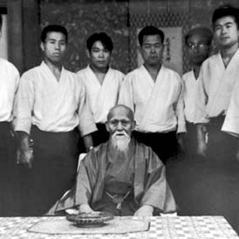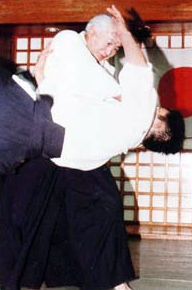|
In Praise of Aikido
|
Fujiyama Dojo P.O. Box 20003 Thorold, ON, Canada L2V 5B3 (905) 680-6389 |
|---|
 Another group of letters we have recently received strike at Aikido as an axe strikes wood. Although a few of these letters come from people who obviously have yet to begin to understand Aikido, others come from actual aiki-deshi who express their frustrations and disappointments in no uncertain terms.
I hope that we have not given the impression that we consider Aikido to be an inferior art, because that couldn't be further from the truth. I have never intended to diminish Aikido's value as Budo. We realize there are differences, but there are also many similarities between Aikido and Daito Ryu Aiki Jujutsu, more so than is readily admitted by most people. My personal reservations have always been about overly eager ukes that get airborne at the drop of a hat, and unfinished techniques that flow like water and are just as diluted. However, I have nothing but respect for those teachers, who, together with proper spirit, teach proper technique.
I would never use terms like "street-wise" techniques, or "effective" techniques to praise any form of Budo or Bujutsu, or to justify its existence. Nor would I consider advising anyone to abandon their current training to join a more "profitable" art, if there is such a thing. The reasons for my views are simple: I have listened to a couple of teachers who, in their younger years, experienced first-hand Morihei Ueshiba's techniques, and their description of them convinced me that the founder of Aikido did not perform or condone weak technique. At least not when he taught them. And it is in this light that I view Aikido. And it is because of this that I consider weak technique to be a disservice to the art and its founder. But all of this I say as a personal view, therefore it is confined within the limits of my understanding, and that is far from comprehensive. I might be missing something that others of more experience and knowledge can see.
For this reason, I would not presume to recommend methods to strengthen their techniques as some have asked in their letters, nor will I advise anyone about changing arts or adding or taking away from something that must remain an absolute if it deserves to be known by the value of its name, since evolution in the present times is regretfully synonymous with dilution and not too different from distortion.
Aikido can stand today by its own power, and we see it as a testimony to the richness of Daito Ryu, for it is undeniable that it is there that Aikido finds its roots. It is a pleasure to watch a skilled teacher performing with sincerity and finding elements in common to both arts. No true Daito Ryu student who loves the essence of the art would feel any different.
So, although we are flattered that you have asked us for advice and help, we can do no less than recommend that you take a second look at your own art, give it time to prove its value, or bring your concerns to your own teachers. Another group of letters we have recently received strike at Aikido as an axe strikes wood. Although a few of these letters come from people who obviously have yet to begin to understand Aikido, others come from actual aiki-deshi who express their frustrations and disappointments in no uncertain terms.
I hope that we have not given the impression that we consider Aikido to be an inferior art, because that couldn't be further from the truth. I have never intended to diminish Aikido's value as Budo. We realize there are differences, but there are also many similarities between Aikido and Daito Ryu Aiki Jujutsu, more so than is readily admitted by most people. My personal reservations have always been about overly eager ukes that get airborne at the drop of a hat, and unfinished techniques that flow like water and are just as diluted. However, I have nothing but respect for those teachers, who, together with proper spirit, teach proper technique.
I would never use terms like "street-wise" techniques, or "effective" techniques to praise any form of Budo or Bujutsu, or to justify its existence. Nor would I consider advising anyone to abandon their current training to join a more "profitable" art, if there is such a thing. The reasons for my views are simple: I have listened to a couple of teachers who, in their younger years, experienced first-hand Morihei Ueshiba's techniques, and their description of them convinced me that the founder of Aikido did not perform or condone weak technique. At least not when he taught them. And it is in this light that I view Aikido. And it is because of this that I consider weak technique to be a disservice to the art and its founder. But all of this I say as a personal view, therefore it is confined within the limits of my understanding, and that is far from comprehensive. I might be missing something that others of more experience and knowledge can see.
For this reason, I would not presume to recommend methods to strengthen their techniques as some have asked in their letters, nor will I advise anyone about changing arts or adding or taking away from something that must remain an absolute if it deserves to be known by the value of its name, since evolution in the present times is regretfully synonymous with dilution and not too different from distortion.
Aikido can stand today by its own power, and we see it as a testimony to the richness of Daito Ryu, for it is undeniable that it is there that Aikido finds its roots. It is a pleasure to watch a skilled teacher performing with sincerity and finding elements in common to both arts. No true Daito Ryu student who loves the essence of the art would feel any different.
So, although we are flattered that you have asked us for advice and help, we can do no less than recommend that you take a second look at your own art, give it time to prove its value, or bring your concerns to your own teachers.
 Budo is not like taking a trip though the supermarket, going from aisle to aisle (or from teacher to teacher, from art to art, or from seminar to seminar), filling up a shopping cart with vast amounts of products (gathering and amassing techniques) that we can pour later into a big cauldron and stir, like the three witches in Macbeth, Act IV, chanting "Double, double, toil and trouble; Fire burn and cauldron bubble."
A teacher once told me that it takes a lifetime for an individual to begin to grasp the essence of Budo. I find myself at odds when trying to counsel someone who grows bored, weary or tired after a meager three year period of training. I wish to be helpful, but I also wish to be fair and just to the art of Aikido, and to those who do their absolute best to instruct it and devote their life to it.
I can certainly relate to doubts, sweat and tears, but I also know that all those are part of learning, and spirit forging, and in many cases the answers are in us and not in an alternate version of how to perform shihonage. This is just a personal opinion, but I encourage you all to persevere. I believe it was Julius Hare who said, "Half the failures in life arise from pulling in one's horse just as he is leaping."
If we understand this saying well, it has a good application in Budo. Budo is not like taking a trip though the supermarket, going from aisle to aisle (or from teacher to teacher, from art to art, or from seminar to seminar), filling up a shopping cart with vast amounts of products (gathering and amassing techniques) that we can pour later into a big cauldron and stir, like the three witches in Macbeth, Act IV, chanting "Double, double, toil and trouble; Fire burn and cauldron bubble."
A teacher once told me that it takes a lifetime for an individual to begin to grasp the essence of Budo. I find myself at odds when trying to counsel someone who grows bored, weary or tired after a meager three year period of training. I wish to be helpful, but I also wish to be fair and just to the art of Aikido, and to those who do their absolute best to instruct it and devote their life to it.
I can certainly relate to doubts, sweat and tears, but I also know that all those are part of learning, and spirit forging, and in many cases the answers are in us and not in an alternate version of how to perform shihonage. This is just a personal opinion, but I encourage you all to persevere. I believe it was Julius Hare who said, "Half the failures in life arise from pulling in one's horse just as he is leaping."
If we understand this saying well, it has a good application in Budo.
|
|---|


